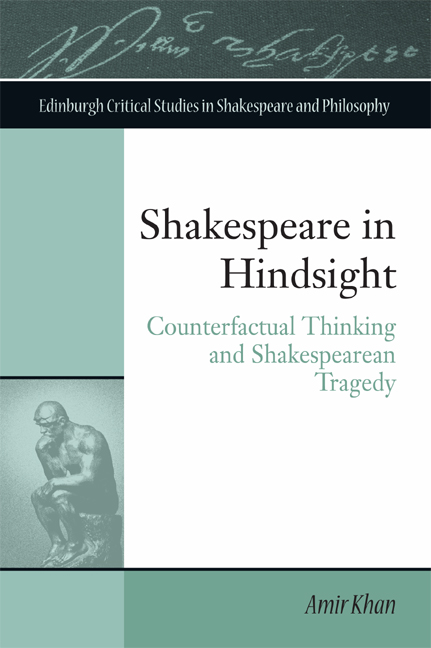Book contents
- Frontmatter
- Contents
- Acknowledgements
- A Note on Texts
- Series Editor's Preface
- Dedication
- 1 Introduction
- 2 My Kingdom for a Ghost: Counterfactual Thinking and Hamlet
- 3 Reversing Good and Evil: Counterfactual Thinking and King Lear
- 4 Staging Passivity: Counterfactual Thinking and Macbeth
- 5 Reversing Time: Counterfactual Thinking and The Winter's Tale
- 6 ‘Why Indeed Did I Marry?’: Counterfactual Thinking and Othello
- 7 Conclusion
- Notes
- Further Reading
- Index
2 - My Kingdom for a Ghost: Counterfactual Thinking and Hamlet
Published online by Cambridge University Press: 05 August 2016
- Frontmatter
- Contents
- Acknowledgements
- A Note on Texts
- Series Editor's Preface
- Dedication
- 1 Introduction
- 2 My Kingdom for a Ghost: Counterfactual Thinking and Hamlet
- 3 Reversing Good and Evil: Counterfactual Thinking and King Lear
- 4 Staging Passivity: Counterfactual Thinking and Macbeth
- 5 Reversing Time: Counterfactual Thinking and The Winter's Tale
- 6 ‘Why Indeed Did I Marry?’: Counterfactual Thinking and Othello
- 7 Conclusion
- Notes
- Further Reading
- Index
Summary
A.C. Bradley's use of character criticism as a means of explaining tragedy away is not a pitfall he is insensitive to. Bradley recognises that the very act of explaining risks explaining (something like tragedy) away.
Any answer we give to the question [of the source of tragic power] … ought to correspond with, or to represent in terms of the understanding, our imaginative and emotional experience in reading the tragedies. We have, of course, to do our best by study and effort to make this experience true to Shakespeare; but, that done to the best of our ability, the experience is the matter to be interpreted, and the test by which the interpretation must be tried. But it is extremely hard to make out exactly what this experience is, because, in the very effort to make it out, our reflecting mind, full of everyday ideas, is always tending to transform it by the application of these ideas, and so to elicit a result which, instead of representing the fact, conventionalizes it. And the consequence is not only mistaken theories; it is that many a man will declare that he feels in reading a tragedy what he never really felt, while he fails to recognize what he actually did feel. It is not likely that we shall escape all these dangers in our effort to find an answer to the question regarding the tragic world and the ultimate power in it.
Why should conventionalising Shakespeare's tragedies be more of a threat today than when Bradley wrote in 1904, enough of a threat to warrant radically different interpretive approaches? One reason is that the historicist method entails the types of misperceptions that Bradley alludes to: a replacement of feeling with explanation and, in time, convention. However unlikely it may be that interpretation can avoid conventionalising the tragic effect, Bradley is sympathetic to critical efforts attempting as much. Yet he, or at least the manner in which his brand of character criticism has been taken up, also consigns us to searching for conventional prescriptive answers, if not in the immediate historical contingencies of Elizabethan England, then in definitive character traits, known in tragedy as ‘flaws’.
- Type
- Chapter
- Information
- Shakespeare in HindsightCounterfactual Thinking and Shakespearean Tragedy, pp. 41 - 66Publisher: Edinburgh University PressPrint publication year: 2015



